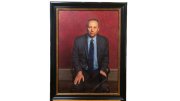Sixteen years after the portrait of President Neil L. Rudenstine (1991-2001) was unveiled in the Faculty Room in University Hall, that of his successor, Lawrence H. Summers (2001-2006), was introduced at a celebration in Widener Library on September 23. Each leader chose to be depicted donning something other than the Harvard president’s distinctive black academic gown. Rudenstine, a literature scholar, appears in his crimson doctoral (’64) gown, book in hand. Summers—an economist (Ph.D. ’82) who devours and delights in data, and who as a former Secretary of the U.S. Treasury has often been in the corridors of government and corporate power worldwide—chose to be shown in business attire, an iPad in hand.
The speakers all addressed some of the enduring changes begun during the Summers presidency—a period he has himself characterized as “not without substantial turbulence.” Those notable changes include a widely emulated approach toward financial aid for undergraduates from low-income families; Harvard’s accelerating commitment to research and teaching in the sciences; a focus on students; and, personally most important, a lasting change in Summers’s family life (meeting English department faculty member Elisa New; they married in late 2005).
Introducing himself as “the other president named Larry,” Lawrence S. Bacow led the proceedings. “Larry is somebody who loves a good argument,” Bacow said of Summers, to laughter, and who “holds his opinions firmly, and expresses them strongly.” And then he got to the heart of the matter: “Larry actually will change his mind in face of a better argument or new information,” Bacow said—a quality all too scarce today. He lauded Summers’s “brilliant scholarship,” distinguished public service, and Harvard accomplishments: reimagining financial aid; “exquisite taste” in hiring faculty members and finding ways to retain them; and being “much beloved by his students” and recognized as a “great teacher”—“a shining example for all of us to emulate” in a place where not everyone takes such interest in students.
Public figures—former U.S. Treasury Secretary and Corporation member Robert E. Rubin ’60, LL.D. ’01, former Harvard Law School dean and now Supreme Court justice Elena Kagan (see the profile in this issue)—and Harvard scientists and others filled in the specifics of their interactions with Summers. Medical School dean George Q. Daley, for example, called their discussions about stem-cell research “one of the richest intellectual experiences of my academic career.” Elisa New amusingly described her early dates with her future husband, and reminded the audience that “What really animated Larry was Harvard as a hub of human progress.”
At the lectern, Summers said that Steven Polson’s portrait “captures a sense of intensity and even restlessness,” to its subject’s pleasure. “I was a man in a hurry” to make a better world. Doing so, he said, meant “empowering the young” and “trying to do new things in new ways”—and that “unrenewed tradition” was a route toward “stagnation.” Thus, “No idea was beyond question in pursuit of Veritas.” If that process led to friction, it was intended to generate intellectual sparks.
“Perhaps I overdid the friction sometimes,” Summers conceded. But he was always animated, he said, by the “deep belief in the transcendent importance of what we do here.” The pursuit of truth, he said, was “never more important than today.” It would be for others to judge his legacy, he concluded, but he was “grateful to have led the community, to spend my professional life in it, and to have my likeness on these walls forever.”
Read a full account at harvardmag.com/summers-portrait-22.









